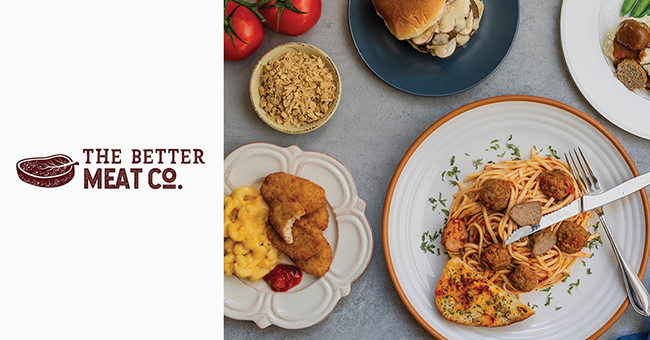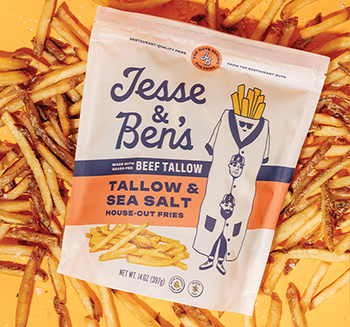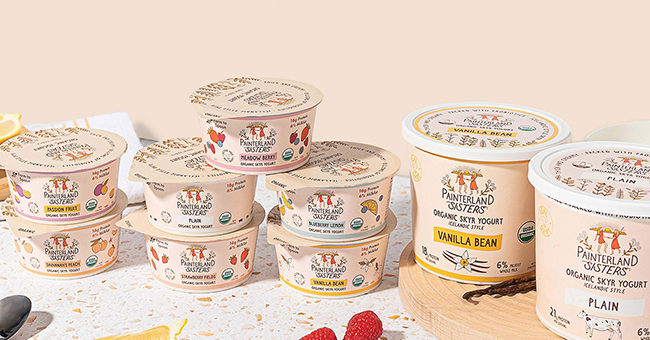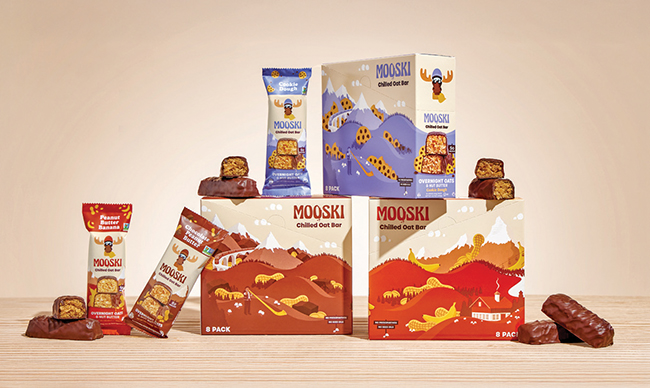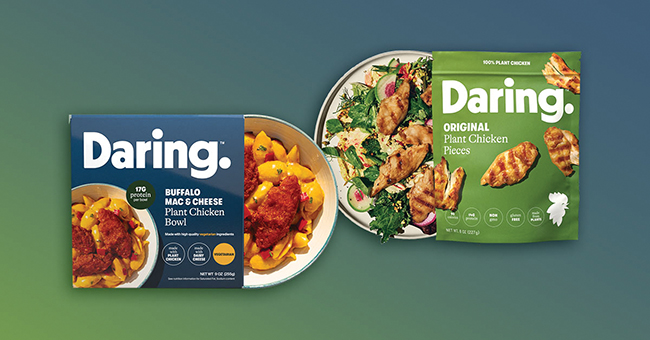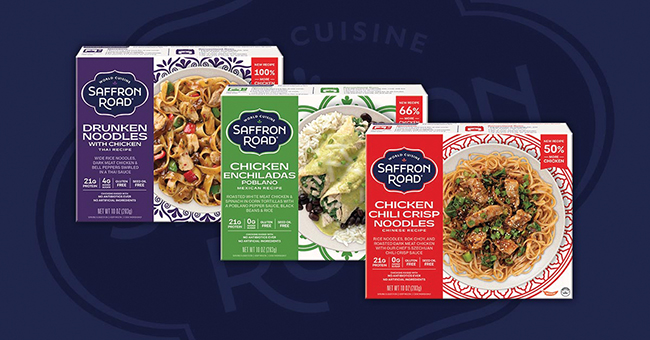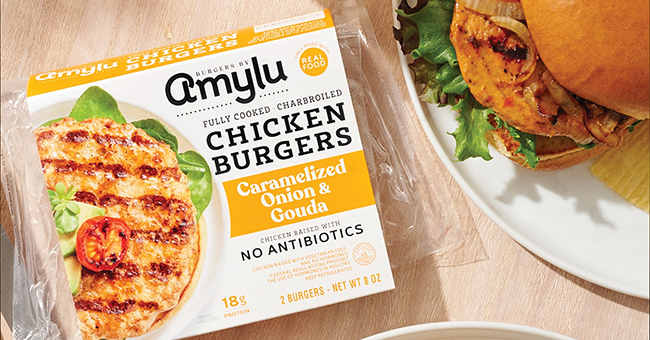NOSHscape: The Latest Food Brand News
The Better Meat Co. Raises $31M
Mycelium-based alternative protein producer The Better Meat Co. (BMC), announced it closed an oversubscribed $31 million round of Series A funding co-led by Future Ventures and Resilience Reserve with participation from Hickman’s Family Farms’ CEO Glenn Hickman, Epic Ventures, Sigma Ventures, and other existing and new investors.
The new cash will enable the Sacramento, Calif.-based company to scale its patented mycoprotein fermentation process to commercial levels that will also allow it to compete with U.S. commodity ground beef. The company said it plans to sell its ingredient at prices lower than the animal-based commodity within 2026.
Those projections were made possible by achieving what is known as “continuous fermentation,” which the company claims is the “holy grail in our sector” and enabled it to cut production costs by more than 30%.
While others in the space have struggled to build consumer-facing brands around their alternative protein inputs, BMC continues to take an industry-centric approach, reemphasizing its alignment with U.S. meat companies alongside the funding announcement. According to the company, it has five signed letters of intent for future orders “from some of the biggest meat companies on the planet.”
BMC also claims its Rhiza input is the only mycoprotein considered “safe and suitable” for inclusion in animal meat, per the U.S. Department of Agriculture; the company has also secured regulatory approval from the U.S. Food and Drug Administration. The company has also recently secured a handful of new patents and international regulatory approvals.
“We’ve invented and patented our tech, received regulatory approval, scaled to a demonstration plant, and proven demand exists for Rhiza mycoprotein. It’s now time to fully commercialize and introduce our new crop that will help the protein industry cut costs and improve nutritionals, all with a much lighter footprint,” said CEO Paul Shapiro, in a press release. “I’m so proud of our team that’s led us to this critical milestone.”
The new capital will scale production capacity at its West Sacramento, Calif., facility approximately ten-fold, the company claims; currently, BMC operates a 9,000-liter demonstration-scale fermentation facility at that site. Glenn Hickman of Hickman’s Family Farms and Future Ventures co-founder Steve Jurvetson will also join the company’s board of directors.
“The world needs better ways to make protein, and The Better Meat Co. has invented one of the most efficient – and delicious – ways to do it,” Jurvetson said in the press release.
The news comes at a tumultuous time for the alternative protein sector. Earlier this year, BMC competitor Meati, which it was once wrapped into a legal battle with over allegedly stolen trade secrets, lost its primary source of funding after failing to meet a revenue target and was on the verge of shuttering before it sold for $4 million in May; the company had raised nearly $450 million in total funding.
Elsewhere, rumors have swirled about the future of Beyond (f.k.a. Beyond Meat) after the company reported yet another quarter of sales declines, laid off 6% of its workforce and onboarded John Boken, managing director in the Turnaround and Restructuring Services practice at AlixPartners, to lead its transformation efforts.
All the while, blended meat products, once seen as lacking a target audience and product-market fit in comparison to pure plant-based proteins, have gained momentum in foodservice under the term “balanced protein.”
Jesse & Ben’s Secures Funding, Expands Retail Footprint
Frozen french fry brand Jesse & Ben’s House Cut secured a “seven-figure” investment round to support its expanded retail footprint.
The undisclosed, oversubscribed seed round is the first institutional funding for the Washington D.C.-based brand. The “party round,” as co-founder and CEO Jesse Konig called it, brought in a diverse pool of strategic partners like Willow Growth Partners, BrandProject, Midnight Venture Partners, Supernatural Ventures, Siddhi Capital, grt sht ventures, Olipop investor Carter Comstock, Orgain founder Andrew Abraham, and content maker couple Lauryn and Michael Bosstick.
“No one’s coming in with $10,000 or $25,000 checks; they’re all generally wanting to have some skin in the game,” Konig added.
Jesse & Ben’s self-manufactures its beef tallow and avocado oil fried potatoes. The funding round needed to come together quickly to support inventory growth for the two national placements – Sprouts Farmers Market and Whole Foods Market – secured in December and January.
“It was a bit of an overwhelming process,” Konig told Nosh. “We had to get our ducks in a row very quickly. We went out to start our fundraising process in February and had it all wrapped up in May, including the due diligence and all the other ridiculous parts of the process that usually take a long time.”
A little over a year since its launch, Jesse & Ben’s will now be in over 1,500 retail doors, including Sprouts, Whole Foods and Fresh Thyme. The brand is also now available on Thrive Market, which allows Jesse & Ben’s to reach consumers where a retail partner is unavailable.
College friends and entrepreneurial partners Konig and Ben Johnson didn’t initially intend to disrupt “Big Potato’s” hold on the frozen fries category, but has found there is a hungry consumer base for seed oil- and additive-free options. The brand currently makes three SKUs – Classic Sea Salt, Rosemary Garlic and Tallow & Sea Salt – available in 14 oz. bags.
As part of its retail expansion, the brand is investing in its sourcing, manufacturing and inventory as it opens up 20 new distribution centers.
The brand has found a “groundswell” of interest, particularly in organic social media posts, which has fueled its growth so far, Konig said.
“The interest stems from people seeking simpler foods where they can read the back of the bag and understand every ingredient. There’s certainly some die-hard people who are just trying to get access to a fun nostalgia food, like a french fry, that meets their needs without using things like ultraprocessed seed oils.”
Painterland Sisters Closes Seven-Figure Seed Round
Organic skyr yogurt brand Painterland Sisters closed a seven-figure seed round led by The Angel Group, its partner fund Supernatural Ventures, and Spacestation Investments. The round also included participation from Scoop Ventures and independent angel investors, including Olympic medalists and lifestyle entrepreneurs.
Painterland Sisters is the fastest-growing dairy brand in the natural expanded channel in terms of dollar growth, per SPINS data.
The Pennsylvania-based brand was founded three years ago by sisters Hayley and Stephanie Painter in an effort to preserve, showcase and utilize their family’s organic regenerative dairy farm. Their ultimate goal is to connect consumers with the source of their food: American farmers.
Available in a variety of flavors, including Strawberry Fields, Meadow Berry and Blueberry Lemon, its lactose-free products contain up to 21 grams of protein per cup with gut-friendly probiotics. Additionally, the yogurt is made from pasture-raised dairy and is non-GMO and free from antibiotics, hormones and synthetic chemicals.
In August, Painterland Sisters landed on Whole Foods Market shelves nationwide, bringing its total door count to over 5,000, including Giant, Fresh Thyme and Costco, among others. As it continues to expand its distribution footprint, the brand will use the fresh funding to support operations and innovation.
The brand previously raised $1.2 million through a Wefunder campaign in February 2024 that included over 700 investors.
Opportunity in the yogurt category is plentiful. As of 2024, North America is the third leading region for both dairy and non-dairy yogurt sales value, according to market researcher Innova Market Insights. Vitamin/mineral fortified, lactose-free and organic claims are among the top positionings in the segment.
The space has seen various M&A activity over the past year, with Lakeview Farms and its recently-acquired noosa brand merging to form Novus Foods, as well as General Mills selling its North American yogurt business to French dairy companies Lactalis and Sodiaal in cash deals valued at an aggregated $2.1 billion.
Mooski Secures $1.5 Million to Scale Chilled Oat Bar Production Amid Triple-digit Growth
Chilled oat bar brand Mooski landed a $1.5 million Series A investment round from an angel investor who previously participated in the brand’s seed round. The investor has extensive experience in the refrigerated bar category, which founder and CEO Robert Broome called “extremely advantageous” for the brand.
Having established product-market fit, Mooski will use the fresh funds to accelerate scaling efforts from a sales, operations and marketing standpoint. The company is currently experiencing its second consecutive year of triple-digit growth, and the capital infusion will help cover expenses associated with that boom, including trade spend and slotting fees.
Mooski will also deploy the capital to fund larger, more frequent production runs necessary to meet demand. Most importantly, said Broome, the brand will invest in marketing efforts to generate greater awareness alongside its recent distribution gains.
“We have a unique and larger-than-life mascot, Alpy, that gives our brand an added layer of character and depth that transcends product. Our goal with these funds is to leverage Alpy in a bigger way and across more marketing touchpoints – social, experiential, partnerships, etc. – to drive awareness and intrigue about Mooski,” Broome told Nosh via email.
Broome – who previously held marketing and innovation roles at Clio and RXBAR – founded Mooski in 2022 on a mission to clean up the granola bar category by focusing on a short, clean ingredient deck and low-sugar, low-calorie positioning. Available in three flavors – Chocolate Peanut Butter, Cookie Dough and Peanut Butter Banana – the bars are a portable spin on muesli that feature 5 grams of protein per serving.
The startup has expanded its brick-and-mortar retail footprint to nearly 1,000 stores across the country since launch. This year, Mooski introduced its products into New Seasons, Woodman’s and Baron’s Market and broke into national retailers for the first time, including launches at Albertsons’ Pavilions division and Kroger, Mariano’s and Roundy’s stores.
The distribution push has, in part, been fueled by a shift in the brand’s manufacturing strategy. In 2023, Mooski pivoted from self-producing in San Diego to working with a co-manufacturer in the Midwest.
“Our switch to a co-man was exactly what we needed to scale the brand. Not [just] because it increased our capacity tremendously – but it also improved our margins and allowed us to focus on other areas of the business at a time when our self-manufacturing was consuming a lot of time, energy and resources,” said Broome.
Mooski has also established a strong presence in the online grocery channel through partnerships with Hungryroot, Misfits Market and Thrive Market. As a perishable brand, the channel allows Mooski to get its products into consumers’ hands without having to manage its own cold chain direct-to-consumer (DTC) operation. According to Broome, the brand’s online grocery partners have the scale to get its products to customers at the right price and at a margin that is, on average, higher than retail.
“These partnerships also allow us to acquire new customers in areas where we don’t yet have retail distribution. Building this national consumer base will only help our retail efforts when we do expand into more places,” said Broome, adding that while the majority of Mooski’s revenue is still retail-based, online grocery is a “healthy and growing” chunk of its business.
The U.S. snack bar market (spanning snack, nutrition and performance bars) is forecasted to reach $9.6 billion by 2029, according to a recent report from Mintel. Bars are not yet the top snacking choice, but the category excels in its perception as a better-for-you option, effectively addressing consumer health needs.
Significant opportunity lies in the refrigerated subcategory, with upstart bars like MUSH and Mid-day Squares also seeking to capture consumer demand for convenient, versatile snack options with an emphasis on unique flavors, textures and formats.
Looking ahead, Mooski will spend the back half of the year focused on strategically entering new doors, as “not every channel or retail banner will be the best fit for our product,” said Broome. The brand has identified a list of specific retailers in which it believes its chilled bars will resonate with consumers, and will strictly be pursuing these accounts.
From an R&D standpoint, Broome said Mooski’s goals are two-fold: “One, continue to make our current product better, as we firmly believe that a consistently excellent product will sell itself. Two, launch new innovations that will both expand our shelf presence and open us up to new occasions.”
Daring Foods Acquired by v2food With Ajinomoto Investment
Plant-based poultry producer Daring Foods was acquired by Australian alt-protein company v2food, with backing by Ajinomoto Co, Inc. Financial terms of the transaction were not disclosed.
Jeff Gendelman, CEO of Daring Foods, told Nosh the partnership will leverage the scale and frozen food expertise of Ajinomoto and the proprietary protein technology of v2food, bringing the brand into new protein formats and meal occasions across retail and foodservice channels.
Since its inception, Daring Foods has used high-moisture extrusion technology to make plant-based takes on chicken formulated with a short list of simple ingredients including soy, vegetable oil and natural flavors and spices.
Joining forces with v2food unlocks a range of solutions for developing and manufacturing a broader platform of plant-based products beyond its current assortment of frozen breaded and unbreaded pieces and wings, as well as a line of single-serve vegetarian meals.
“We want to own clean plant protein,” Gendelman said. “That’s our focus.”
Ajinomoto operates a billion-dollar frozen foods business in the U.S. – with brands including Ling Ling, Jose Ole and Tai Pei – and offers significant advantages in distribution and retail execution, Gendelman said.
According to Gendelman, Daring Foods’ products are sold in “north of 16,000 to 17,000” retail doors nationwide, having gained distribution over the past few years. He said the company has achieved a 24% compound annual growth rate since 2021 and boasts a high repeat rate among top plant-based meat alternative brands.
“We’re very proud of that growth in a space that’s been contracting,” he said.
Though many Americans have tried plant-based meat and expressed interest in the category, a minority of consumers purchase these products regularly, according to the Good Food Institute (GFI). Taste and price expectations play a large role in adoption, but benefits around health and nutrition are also important in motivating consumers to switch.
Beyond Meat’s recent struggles have illuminated many of the barriers to growth for plant-based foods, including price and a negative narrative surrounding the health impacts of highly processed meat alternatives.
“This space should have been built much more thoughtfully, paying more attention to the fact that the consumer was looking for healthy products, too,” Gendelman said. “A lot of businesses invested too heavily in the supply curve before the demand curve came to fruition.”
Daring Foods has raised $113.8 million in total funding since its founding seven years ago, according to Crunchbase, which included a $65 million Series C round led by Founders Fund alongside existing investor D1 Capital Group. Its backers include celebrities and professional athletes such as Drake, Naomi Osaka, Cam Newton and Steve Aoki.
Gendelman told Nosh he will remain in his role leading the business to help “turbocharge growth” and that the brand will “feel and look the same as it did the day before the close.” He assumed leadership of the Los Angeles-based company after its founder and former CEO Ross Mackay stepped down to launch the hydration brand Cadence.
“We will continue to operate here in the U.S. not as an independent brand but one that can execute on its own objectives,” he said, adding, “The team has done an amazing job to continue to roll into this next chapter holding hands.”
Like countless other CPG brands – including giants like Hershey and Mondelēz International – SkinnyDipped has been forced to navigate surging cocoa prices over the past few years. However, by pinpointing efficiencies throughout its supply chain, the company has maintained pricing amidst the commodity crisis.
“Our goal was to not raise prices, because we know that there has been a significant impact already on the end of the consumer in terms of inflation. Everyone sees it on that grocery bill,” said Griffith. “So we are doing everything we can as a brand to hold pricing for our consumer.”
SkinnyDipped will spend the back half of the year focused on expanding distribution for its coconut bites, which have already had “incredible reception,” according to Griffith, citing Amazon data and reactions from retailers. The company will also work to build out its presence in the c-store channel and foodservice, which is a “huge unlock.”
Saffron Road’s ‘Ambitious’ Rebrand Taps MAHA, GLP-1 Trends
For about six months, Saffron Road was under construction.
The frozen meal maker introduced its “most ambitious brand refresh” in its 15-year history, according to founder and CEO Adnan Durrani, as it aims to align with today’s consumer trends, including the growing anti-seed oil sentiment and an insatiable appetite for protein.
Saffron Road’s renovated product line, which rolled out in August to retailers nationwide, features reformulated recipes – eliminating canola and soybean oils and adding, in some cases, twice as much chicken or lamb – and a bold new look that integrates artwork that reflects the brand’s global heritage. The Certified B Corp also is transitioning to plant-based and compostable fiber trays to strengthen its commitment to sustainability.
While the brand was built on introducing international flavors to the freezer aisle – with cuisines spanning Indian, Korean, Thai, Mexican, Moroccan and more – its core consumers are “modern millennials and aspirational baby boomers” who are seeking more nutritious, premium options in the set, Durrani told Nosh.
The latest changes were informed by a “very deep dive” using retail tracking data, panel studies and consumer surveys over the past year, he said. Transitioning away from seed oils has been in the works for more than five years, long before they were deemed unhealthful by the Make America Healthy Again (MAHA) movement, he added.
“Our research and the data reveals that the opportune time [to remove seed oils] was now,” he said. “Why? MAHA’s mandates align with Saffron Road’s of reducing harmful food additives, potentially aligning U.S. standards closer to Europe’s more stringent regulations, and promoting fresh, minimally processed foods.”
Moreover, the rising adoption of weight loss medications marketed under names such as Ozempic, Wegovy and Mounjaro has fueled demand for products with higher protein density and portion control, he added.
“… with now as much as 10% of Americans on GLP-1 drugs, that is a very large cohort that cannot be ignored,” he said. Homing in on these attributes “maps very nicely with a material percentage of our core consumers as well as aligns with non-core modern millennials that we are also looking to bring into the Saffron Road brand.”
As a growing number of restaurant and retail brands ditch seed oils, the frozen food category has lagged behind, Durrani claimed. Saffron Road is the first Seed Oil Free Certified frozen entree in the market, he said.
To support the renovation, Saffron Road is launching a full-funnel marketing campaign that includes television, paid search, digital video and influencer activation, Durrani said.
The company has also created a curated insiders club, dubbed Saffron Roadies, that already comprises more than 2,500 brand ambassadors and will engage consumers through targeted social campaigns and dietary apps like Yuka and Seed Oil Scout, he said.
“Today’s most influential marketing doesn’t always come from big ad budgets — it comes from real people sharing real enthusiasm who are authentically passionate,” Durrani said. “Saffron Roadies will be trusted voices within their communities, and by tapping into that network, we’re building authentic advocacy at scale.”
Amylu Foods Cooks Up Growth With New Investment
Amylu Foods secured an investment from TowerBrook Capital Partners and Prelude Growth Partners that will support continued retail expansion.
Dating back just over a century, Chicago-based Amylu Foods manufactures value-added chicken products including sausages, meatballs and burgers that are sold under the Amylu brand and private label. The company produces dozens of offerings featuring organic, antibiotic-free and nitrate-free claims. Earlier this year, the brand unveiled Frozen Breakfast Patties and an Organic Chicken Sausage line.
Last year, Amylu Foods acquired Klement’s Sausage Company, diversifying its portfolio into new categories, including snack sticks and summer sausages, while enhancing its production capacity.
The company said it plans to leverage its partnership with TowerBrook to further scale operations and expand across channels.
“At Amylu, our success has always been built on delivering great-tasting, clean-ingredient products that our consumers genuinely love and trust. This partnership with TowerBrook is the natural next step for our growth strategy, and we’re confident they’re the right partner to help us expand our business across the nation given their strong track record of scaling food businesses, particularly in the protein space,” said Steven Zoll, CEO of Amylu Foods, in a press release.
A Certified B Corporation, TowerBrook Capital Partners has $23 billion of assets under management and invests in businesses across multiple sectors in Europe and North America spanning consumer products and services, financial services, business services and healthcare.
“Amylu’s long-standing commitment to quality, innovation, and health-conscious convenience has earned it a strong reputation in the industry and outstanding commercial momentum,” said Michael Recht, managing director of TowerBrook, in the release. “We look forward to partnering with Steve and the Amylu team to continue to build upon the company’s legacy of delivering unique products to its loyal consumers.”
Sidley Austin served as legal counsel to TowerBrook. J.P. Morgan and Winston & Strawn acted as financial advisor and legal counsel, respectively, to Amylu Foods.
Prelude Growth Partners, a leading consumer-focused growth equity firm, this week announced the close of its third fund with $600 million in total commitments, bringing its total assets under management to $1.3 billion. The group supports “brands made for the new modern consumer” by providing category experience and value-added operational support. Its food and beverage investment portfolio includes Riverside Natural Foods (Made Good), Bachan’s, So Good So You, Banza and Fly By Jing.


Receive your free magazine!
Join thousands of other food and beverage professionals who utilize BevNET Magazine to stay up-to-date on current trends and news within the food and beverage world.
Receive your free copy of the magazine 6x per year in digital or print and utilize insights on consumer behavior, brand growth, category volume, and trend forecasting.
Subscribe